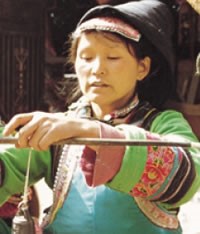Luowu in China

Photo Source:
Copyrighted © 2026
Operation China, Asia Harvest All rights reserved. Used with permission |
Send Joshua Project a map of this people group.
|
| People Name: | Luowu |
| Country: | China |
| 10/40 Window: | Yes |
| Population: | 29,000 |
| World Population: | 29,000 |
| Primary Language: | Nasu, Wusa |
| Primary Religion: | Ethnic Religions |
| Christian Adherents: | 0.00 % |
| Evangelicals: | 0.00 % |
| Scripture: | New Testament |
| Ministry Resources: | Yes |
| Jesus Film: | No |
| Audio Recordings: | Yes |
| People Cluster: | Tibeto-Burman, other |
| Affinity Bloc: | Tibetan-Himalayan Peoples |
| Progress Level: |
|
Introduction / History
The Luowu are believed to have originated in Wuding County, northern Yunnan. Chinese records state that the Luowu lived there in the 1380s, in the early years of the Ming Dynasty (1368-1644). Because of their many expeditions the Luowu were allowed to serve in the local court of the area. They migrated to other parts of Chuxiong Prefecture and ended up where they live today.
The Luowu, who were first referred to in a 1909 study, are one of numerous subgroups of the official Yi nationality. The Luowu were described in 1913 as timid and peaceful. Ninety percent of the people suffered from goiter, while other prevalent diseases included malaria, smallpox, leprosy, typhoid fever, and tuberculosis. The Luowu living in the Tongchang District of Yimen County call themselves Alu. These people reportedly speak a language so different from the Nisu (another Yi subgroup) in the southern part of their own district that they have to use Chinese to communicate with each other.
What Are Their Lives Like?
The 1995 Chuxiong Xian Zhi states, "The Luowu are monogamous and prefer to marry only other Luowu. A Luowu couple meets through a matchmaker and then becomes engaged. A Luowu wedding ceremony lasts for three days. On the first day the bridegroom gets up at daybreak and goes to the home of his bride where he meets with his matchmaker, bride, and all of her relatives to present wedding gifts to them. Many important rituals ensue. On the final day the suona (a long horn which emits a high-pitched sonorous wail) is blown. The bride and her entourage are forbidden to enter the house of the groom until the bride's family have blown the suona horn. The two are considered married when the bride has entered the home of her bridegroom."
What Are Their Beliefs?
The Luowu are polytheists. They live in fear of and bondage to a number of deities and demons. They believe that, although some spirits are good, most are vengeful and bad, desiring to kill and destroy them. The Luowu also venerate their ancestors to the fourth or fifth generation.
Many early missionaries were great ambassadors for Christ. Maria Dyer, who became Hudson Taylor's wife, revealed her deep commitment when she considered Taylor's marriage proposal. Dyer wrote, "If he loves me more than Jesus he is not worthy of me - if he were to leave the Lord's work for the world's honour, I would have nothing further to do with him." However, few missionaries working in China prior to their expulsion in 1949 focused on the groups in the mountains of central Yunnan. As a result, the Luowu remain unreached today, although gospel recordings in their language were produced in 1999.
What Are Their Needs?
Without the guidance of Christ, these people are like sheep without a shepherd. They need the good shepherd in their families and communities.
Prayer Points
Pray for the authority of Christ to bind hindering spiritual forces to lead them from darkness to light.
Pray for signs and wonders to happen among them and for great breakthroughs with a rapid multiplication of disciples and house churches.
Pray for bold workers who are driven by the love of the Holy Spirit to go to them.
Pray for an unstoppable movement to Christ among them.